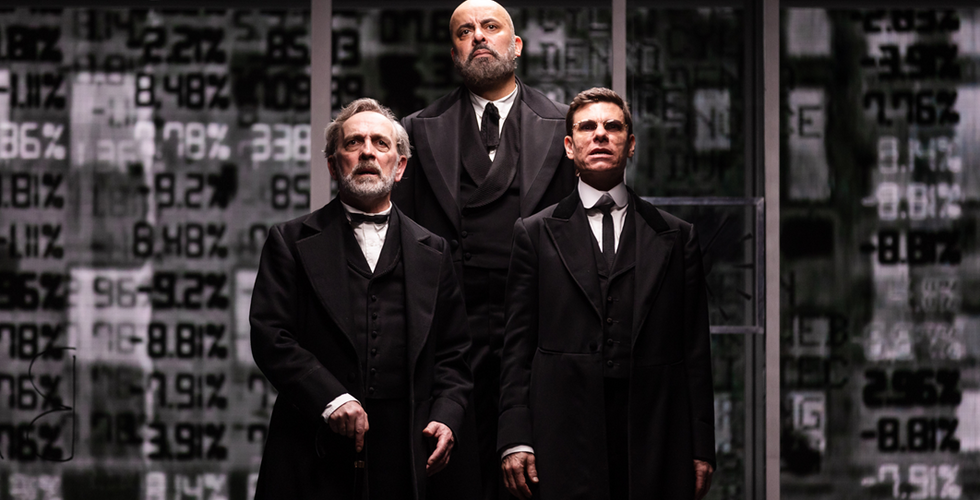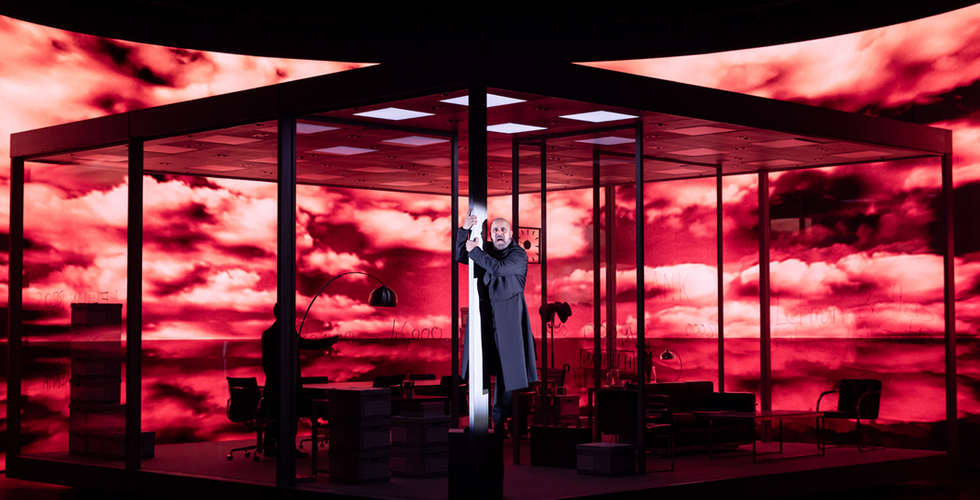The Lehman Trilogy - Sydney Theatre Royal (NSW)
- Justin Clarke

- Mar 3, 2024
- 5 min read
Written by Stefano Massini. Adapted by Ben Power. Directed by Sam Mendes.
Reviewed by Justin Clarke
Theatre Royal, Martin Square
Until March 24th, 2024
Grandiose storytelling is compacted into three hours under the stellar direction of Sam Mendes, an incomplete story still holds astounding resonance
The 1900’s of American theatre has an entire sub-genre dedicated to the ideal of the all-encompassing “American Dream”. Take for instance Edward Albee’s aptly titled American Dream, Death of a Salesman by Arthur Miller, Of Mice and Men by John Steinbeck, A Streetcar Named Desire by Tennessee Williams, or Fences by August Wilson. It’s not mere coincidence that the tales of success, determination and grit are all told through a male lens, as it is a reflection of how history is perceived by those who wrote it. The Lehman Trilogy, adapted from the Italian novelist and playwright Stefano Massini, is no different to this male-centric focus on capitalism and the pursuit of the long-dead idealism of an American Dream.
Academy Award Winner Sam Mendes directs the Tony-Award Winning Best Play The Lehman Trilogy and now it has arrived to Australian shores to showcase a cautionary tale of capitalism in its purest form. Told over the span of three generations, three acts and just over three hours, we are privy to the makings of America’s greatest and most powerful global financial services firm from its small start in 1850, through to its world-changing collapse in 2008.
The Sydney Production of The Lehman Trilogy. Images by Daniel Boud.
As the curtain rises, exposition is given for the inevitable bankruptcy of the Lehman Brothers investment firm, with the government deciding whether or not to bail out the company. Rising fluidly from behind a crater of boxes, the clock is turned back to 1850 as Henry Lehman (Adrian Schiller) first steps onto American soil, a Jewish immigrant from Bavaria, Germany. From here, Lehman’s Fabrics and Cotton is established, in a small room, with a handle that sticks and a crudely drawn yellow on black sign is crafted. Before long, the two other Lehman brothers, Emanuel Lehman (Howard W. Overshown) and Mayer Lehman (Aaron Krohn) join Henry, and together their empire begins.
Adapted from Ben Power, the entire production is shed to the bare bones of storytelling - the original play lasting five hours, a length that would make Scorsese blush - with much of the Lehmans' history outside of the changing business being left by the wayside. The notion of wealth and how it is built is told by the puppets pulling the strings, yet the slaves on the plantations on which the Brothers’ cotton empire was first formed are left to be fleeting characters. The women who come and go in their lives are left to be caricatures, drawing laughs from the audience, yet leaving an odd taste in your mouth afterwards. This is a tale told through the eyes of the men who built an empire, handled by three actors, portraying over 50 characters and yet, it somehow feels like it’s just not enough.
Es Devlin’s set design is vast, yet contained, coupled with Luke Hall’s curved video work that encapsulates the rotating set. The corporate spaces evoked by Devlin are both suffocating, yet open, the glass walls and architraves suggesting that anything is possible in the world of finance, whilst allowing the audiences to be in the room where world-changing decisions are made. Meanwhile, Hall’s cyclorama of backgrounds and visuals begin simple enough, a greying landscape of the Manhattan skyline swiftly changes to the burning fields of cotton in the Civil War, before entering the ethereal world of “pure finance” where commodities are sold and bought without ever being physically seen or touched. It makes for a gripping and visually aesthetic theatrical experience.
an astonishing piece of storytelling, told through the skilled hands of three actors and directed by a master of the craft.
What makes The Lehman Trilogy captivating comes down to Mendes’ superbly orchestrated direction. It is both expansive, yet contained within the four walls of the set. Mendes and Power work together to elevate the text, keeping a third person storytelling as the actions are played out in front of us. Grandfathers, brothers and sons come and go with a slight change of voice and posture, boxes are piled up to become towers and structures, never letting us forget the collapse that they symbolise, and accompanying the production is Cat Beveridge’s ominously beautiful piano orchestrations.
Beveridge’s presence makes the experience beyond that of a simple play. Indeed, the titles projected at the start of the play, coupled with the floating sounds of the piano shows Mendes’ craft as an award-winning film director as well. One can’t help but think that Mendes is the perfect director to encapsulate such a grandiose form of storytelling on stage.
As each act takes its shape, we see the Brothers move from cotton to coffee, middle men to investments, before eventually building what would become a powerhouse figure in New York’s Wall Street. We’ve seen these tales before with The Big Short and The Wolf of Wall Street, and like these films, greed is laid bare in front of us. But it’s not without a touch of admiration for the Lehman family. Phillip Lehman’s ability to predict what will be the next big investment takes a large chunk of the second act, as he scores hit after hit, taking in stocks and shares of commodities that never pass hands. It all leaves you with a mixed feeling of disgust, astonishment and, maybe a hint of being impressed by the skill of it all.
Despite the stories left on the cutting room floor, The Lehman Trilogy is an astonishing piece of storytelling, told through the skilled hands of three actors and directed by a master of the craft. As the Lehman’s story comes hurtling towards a cataclysmic ending, the cautionary tale feels deeply reflective of our current financial state, leaving a target on the backs of the financial puppeteers who essentially run our world. It is a tale of capitalism at its purest form, reflective of an American Dream that no longer exists, or if it does, it is a monstrous figure of its former self.
The Lehman Trilogy runs for approximately 3 hours and 20 minutes, including two 15-minute intervals.
CAST
AARON KROHN Mayer
HOWARD OVERSHOWN Emanuel
ADRIAN SCHILLER Henry
RAVI AJULA Understudy Emanuel
LEIGHTON PUGH Understudy Henry
SIMON VICTOR Understudy Mayer
CAT BEVERIDGE Principal Pianist
ANYSSA NEUMANN Alternate Pianist
CREATIVE TEAM
STEFANO MASSINI Author
BEN POWER
SAM MENDES Director
ES DEVLIN Set Designer
KATRINA LINDSAY Costume Designer
LUKE HALLS Video Designer
JON CLARK Lighting Designer
NICK POWELL
DOMINIC BILKEY Co-Sound Designer
CANDIDA CALDICOT Music Director
POLLY BENNETT Movement
ZOÉ FORD BURNETT West End Director
RORY MCGREGOR International Tour Director
























%20(1).png)
Comments